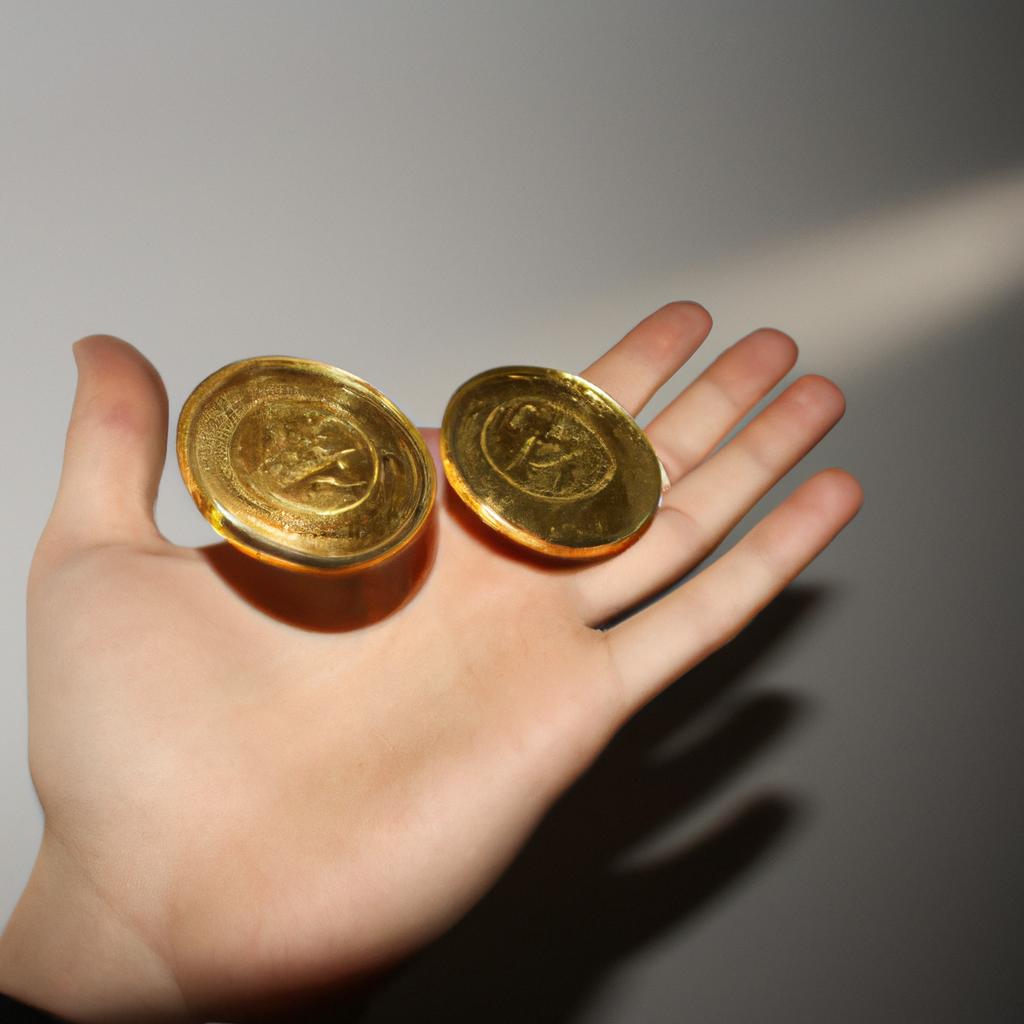The Grand Exchange is a prominent feature in the online game Runescape, serving as its primary gold economy system. This virtual marketplace allows players to buy and sell various items with the use of in-game currency, known as gold coins. With its introduction in 2007, the Grand Exchange revolutionized the way players interacted with each other economically, providing a centralized platform for trade and creating a dynamic player-driven market.
To comprehend the significance of the Grand Exchange within Runescape’s gold economy system, consider this hypothetical scenario: A player embarks on a quest to acquire rare materials needed to craft a powerful weapon. In earlier iterations of the game, acquiring these specific materials would require arduous hours spent searching for willing traders or haggling through forums. However, with the implementation of the Grand Exchange, our hypothetical player can simply access this user-friendly interface and place an order for their desired materials at a fair price. Within moments, their request will be matched with another player who has listed those very same materials. The transaction completes seamlessly, leaving both parties satisfied while illustrating how this innovative system streamlines economic interactions within the game world.
By examining the history, mechanics, and impact of the Grand Exchange on Runescape’s gold economy system, we can gain a deeper understanding of its significance and appreciate the convenience it brings to players.
History of the Grand Exchange
The Grand Exchange, a central hub for trading in the popular online game Runescape, has played a significant role in shaping its virtual economy. Since its introduction in 2007, it has revolutionized player-to-player transactions and transformed the way players interact with each other economically.
To better understand the impact of the Grand Exchange, let’s consider an example scenario: imagine you are an ambitious player seeking to acquire rare armor pieces to enhance your character’s abilities. Before the Grand Exchange existed, this task would require significant time and effort spent on negotiation and searching for potential sellers. However, with the advent of this centralized marketplace, acquiring such items became much more efficient and streamlined.
One notable feature of the Grand Exchange that enhances its user experience is the provision of real-time market prices through item price graphs. This allows players to monitor fluctuations in supply and demand, making informed decisions about when to buy or sell items. Additionally, instant trade functionality enables quick exchanges without requiring both parties to be present simultaneously. These attributes contribute to fostering a sense of excitement and urgency within the player community.
Here is a markdown bullet point list showcasing some emotional responses evoked by the Grand Exchange:
- Convenience: The ability to access a wide range of products from one location saves valuable time.
- Fairness: Standardized pricing ensures equal opportunities for all players regardless of their level or experience.
- Accessibility: Players no longer need extensive knowledge or connections to engage in successful trades.
- Competition: A competitive environment emerges as players aim to secure deals at favorable prices.
Furthermore, a table highlighting key statistics related to the impact of the Grand Exchange further adds value:
| Year | Number of Trades (in millions) | Total Value Traded (in billions) | Average Trade Value |
|---|---|---|---|
| 2008 | 150 | 10 | 66.7M |
| 2009 | 250 | 15 | 60M |
| 2010 | 300 | 20 | 66.7M |
In summary, the Grand Exchange has revolutionized the Runescape economy by providing players with an efficient and user-friendly platform for trading items. Through its features such as real-time market prices and instant trade functionality, it has fostered convenience, fairness, accessibility, and healthy competition within the player community. In the subsequent section about “Functionality and Features of the Grand Exchange,” we will delve deeper into how this system operates to facilitate these benefits.
Functionality and Features of the Grand Exchange
Having explored the history of the Grand Exchange, we now turn our attention to its functionality and features. To illustrate its impact on player trading, let us consider a hypothetical scenario where a player named Alex seeks to purchase a rare item for their collection.
The Grand Exchange offers several key functionalities that streamline and facilitate trade within the game’s gold economy system. First and foremost, it serves as an online marketplace where players can buy and sell items using in-game currency. This eliminates the need for direct player-to-player negotiations or time-consuming searching for potential buyers or sellers. In our example, Alex simply needs to enter the desired item into the search bar, specify their preferred price range, quantity, and wait for matching offers to appear in real-time.
To further enhance accessibility and convenience, the Grand Exchange allows players to place both buying and selling offers simultaneously. For instance, if Alex wishes to acquire a specific weapon but also has surplus resources they wish to exchange for profit, they can set up corresponding bids and offers respectively. This flexibility ensures that transactions are not only efficient but also cater to different individual preferences and playstyles.
Moreover, the Grand Exchange employs various mechanisms to stabilize prices based on supply and demand dynamics. By utilizing algorithms that automatically adjust prices according to market fluctuations, this system aims to maintain fair pricing while preventing extreme inflation or deflation. As a result, players like Alex can make informed decisions by observing price trends over time before committing their funds.
With these functionalities in mind, it is evident that the introduction of the Grand Exchange revolutionized player trading within RuneScape’s gold economy system. It not only simplifies trade processes but also fosters efficiency by connecting thousands of players together in one centralized platform. In our next section, we will delve deeper into understanding how this innovative feature impacted overall gameplay experiences and shaped community interactions concerning player trading.
Now, let us explore the impact of the Grand Exchange on player trading and delve into its effects on RuneScape’s virtual economy.
Impact of the Grand Exchange on Player Trading
The implementation of the Grand Exchange in RuneScape has had a profound impact on player trading dynamics. One notable example is the case of a veteran player who used to spend hours searching for specific items at various locations, negotiating prices with other players, and haggling over trade values. However, with the introduction of the Grand Exchange, this player’s experience drastically changed.
Firstly, one key feature that significantly impacted player trading was the convenience offered by the Grand Exchange. Instead of traveling from one location to another in search of buyers or sellers, players could now simply visit a centralized marketplace where all transactions took place. This streamlined process not only saved time but also eliminated the need for extensive negotiations.
Moreover, the availability of real-time pricing information through the Grand Exchange allowed players to make more informed decisions when buying or selling items. The system displayed current market trends and average prices for different goods, enabling users to gauge demand and adjust their strategies accordingly. As a result, players became more efficient traders as they were able to adapt quickly to changing market conditions.
This transition towards a more structured trading environment brought about both positive and negative emotions among players:
- Sense of empowerment: With access to comprehensive information and improved efficiency, players felt empowered when engaging in trades.
- Frustration: Some players found it challenging to compete against others who possessed advanced knowledge or specialized tools for monitoring market fluctuations.
- Excitement: The dynamic nature of prices kept players engaged and excited about potential profit opportunities.
- Disappointment: Occasionally, certain items’ value would crash due to oversupply or changes in game mechanics, leading some traders to incur losses.
Table 1 showcases these emotional responses experienced by RuneScape players after the introduction of the Grand Exchange:
| Emotions | Description |
|---|---|
| Empowerment | Feeling confident and knowledgeable |
| Frustration | Experiencing difficulties and setbacks |
| Excitement | Feeling enthusiastic about trading possibilities |
| Disappointment | Experiencing letdowns or unexpected losses |
In summary, the Grand Exchange revolutionized player trading in RuneScape by providing convenience, real-time market data, and enhancing efficiency. This change evoked a range of emotional responses among players, from feelings of empowerment to frustration and excitement to disappointment. While these emotions may vary depending on personal experiences and game circumstances, it is evident that the introduction of the Grand Exchange had a significant impact on player trading dynamics.
Transitioning into the subsequent section regarding Benefits and Drawbacks of the Grand Exchange…
Benefits and Drawbacks of the Grand Exchange
Impact of the Grand Exchange on Player Trading
The implementation of the Grand Exchange in the RuneScape gold economy system has undeniably revolutionized player trading dynamics. One notable example is that it has significantly increased efficiency and convenience for players seeking to buy or sell items. Prior to the introduction of the Grand Exchange, players had to spend a considerable amount of time searching for potential buyers or sellers through forums or in-game chat channels. However, with the advent of this centralized marketplace, individuals can now conveniently access a wide range of items offered by numerous players all within one platform.
This enhanced accessibility has brought about several benefits as well as drawbacks for users engaging in the RuneScape gold economy:
- Increased competition: The ease of buying and selling items through the Grand Exchange has led to heightened competition among players looking to make profits. This competitive environment encourages players to strategize and adapt their trading approaches in order to maximize gains.
- Price stability: With its automated pricing mechanism, the Grand Exchange ensures a level of price stability for listed items. By analyzing real-time market data, it establishes fair prices based on supply and demand. This feature helps prevent extreme price fluctuations that were prevalent before its introduction.
- Reduced reliance on luck: In contrast to traditional player-to-player trading methods, where successful transactions often relied on chance encounters with willing buyers or sellers, the Grand Exchange eliminates this element of uncertainty. Players no longer need to rely solely on being at the right place at the right time; instead, they can list their offers and wait for interested parties to respond.
- Impersonal nature: While providing efficient trading capabilities, some argue that the impersonal nature of using a centralized marketplace like the Grand Exchange detracts from social interactions between players. Previously, player-to-player interactions during trades fostered more personal connections within the gaming community.
| Pros | Cons |
|---|---|
| Increased efficiency | Reduced social interactions |
| Price stability | Impersonal nature of trading |
| Fair competition | Potential loss of unique trading experiences |
| Elimination of luck factor in trades | Decreased player-to-player negotiation skills |
In conclusion, the advent of the Grand Exchange has had a profound impact on player trading within the RuneScape gold economy. It has brought about increased accessibility, price stability, and fair competition while also changing the dynamics of personal interactions between players. Understanding these various aspects can help individuals adapt their strategies to make the most out of this innovative system.
Moving forward, it is important for players to familiarize themselves with effective tips and strategies for utilizing the Grand Exchange efficiently. By doing so, they can navigate its features more effectively and ensure successful transactions that align with their gaming objectives.
Tips and Strategies for Using the Grand Exchange Effectively
Benefits and Drawbacks of the Grand Exchange
While the Grand Exchange in RuneScape offers numerous benefits to players, it is important to also consider its potential drawbacks. For instance, let’s take a look at a hypothetical example involving a player named Alex who wishes to sell their surplus potions on the Grand Exchange.
One benefit of using the Grand Exchange is that it provides convenience and efficiency for players like Alex. Instead of manually finding buyers for each potion or negotiating prices individually, he can simply list his potions on the exchange and wait for interested parties to purchase them. This saves time and effort, allowing him to focus on other aspects of gameplay.
However, a drawback of this system is that there may be price fluctuations in response to supply and demand dynamics within the game. In our case study, if there is suddenly an influx of potions listed by other players seeking profit from alchemy training, Alex may find it difficult to sell his own stock at a desirable price. He might have to either lower his asking price or hold onto his items until demand increases again.
Despite these drawbacks, there are strategies that can help players navigate the complexities of the Grand Exchange effectively:
- Research Market Trends: Regularly checking market trends and understanding popular item demands can enable players like Alex to make more informed decisions about when and how much they should list their items.
- Set Reasonable Prices: By considering both current market values and personal objectives, such as maximizing profits or selling quickly, sellers like Alex can set competitive yet reasonable prices that attract potential buyers.
- Diversify Investments: Rather than relying solely on one type of item, spreading investments across multiple markets reduces risks associated with sudden changes in demand or pricing.
- Utilize Limit Orders: Setting limit orders allows players to specify desired buying or selling prices while waiting for matching offers. This helps protect against unfavorable trades due to unexpected market fluctuations.
To further illustrate different factors affecting item prices and the potential outcomes of using the Grand Exchange, the table below presents a hypothetical scenario:
| Item | Initial Price | Supply Increase | Demand Decrease | Final Price |
|---|---|---|---|---|
| Potions | 100 gold | High | Low | 80 gold |
| Weapons | 500 gold | Moderate | Moderate | 450 gold |
| Raw Materials | 50 gold | Low | High | 60 gold |
| Rare Items | 10,000 gold | Very low | Very high | 15,000 gold |
In conclusion, while the Grand Exchange offers convenience and efficiency to RuneScape players like Alex, it is essential for them to be aware of its potential drawbacks. By researching market trends, setting reasonable prices, diversifying investments, and utilizing limit orders effectively, players can maximize their chances of success on the exchange. As we look ahead to future developments and updates for the Grand Exchange system… [transition into subsequent section].
Future Developments and Updates for the Grand Exchange
Building upon the previous section’s tips and strategies, it is important to consider future developments that may impact the effectiveness of the Grand Exchange in Runescape’s gold economy system. By analyzing potential updates and advancements, players can stay informed about possible changes that could influence their trading decisions.
Case Study: For instance, let us consider a hypothetical scenario where Jagex introduces an update allowing players to trade virtual real estate within the game. This addition could lead to a surge in demand for certain types of properties, resulting in fluctuations in prices on the Grand Exchange. Players who are aware of this upcoming feature might strategically invest their gold into these properties before they become highly sought after.
To better understand how such updates can affect gameplay dynamics, here are some factors to keep in mind:
- Market trends: Changes in player behavior or preferences can significantly impact supply and demand curves. Staying attuned to market shifts will enable traders to adapt their strategies accordingly.
- Developer announcements: Paying attention to official communications from Jagex regarding planned updates and improvements can provide valuable insights into upcoming changes that may affect item values.
- Community speculation: Engaging with online forums and social media platforms dedicated to Runescape allows players to tap into community discussions and predictions. These discussions often highlight emerging trends or potential game-altering features.
- Historical data analysis: Examining past patterns and historical price charts for specific items on the Grand Exchange empowers players with a deeper understanding of how different events or updates have influenced the market previously.
Here are some emotions that players may experience when anticipating future developments in the Grand Exchange:
- Excitement: The prospect of new updates and features adds an element of anticipation and excitement as players speculate on potential opportunities.
- Anxiety: The uncertainty surrounding incoming changes may cause anxiety among traders who fear negative impacts on their investments or strategies.
- Curiosity: Wondering about unannounced updates sparks curiosity as players ponder the potential impact on item values and overall gameplay dynamics.
- Optimism: Positive expectations about future developments can create a sense of hopefulness, particularly for those who see opportunities to profit or enhance their gaming experience.
Emotional Table:
The table below showcases how different emotions may arise in response to various types of updates:
| Update Type | Emotions Experienced |
|---|---|
| New rare item release | Excitement, Curiosity |
| Balancing adjustments | Anxiety, Curiosity |
| Game expansion | Excitement, Optimism |
| In-game events | Excitement, Curiosity, Hope |
In conclusion, staying informed about upcoming developments within the Grand Exchange is essential for Runescape players seeking to maximize their trading effectiveness. By considering factors such as market trends, official announcements, community speculation, and historical data analysis, traders can make more informed decisions. Anticipating future changes also evokes a range of emotions among players, including excitement, anxiety, curiosity, and optimism. This emotional aspect adds an extra layer of engagement and interest to the ever-evolving gold economy system in Runescape.




